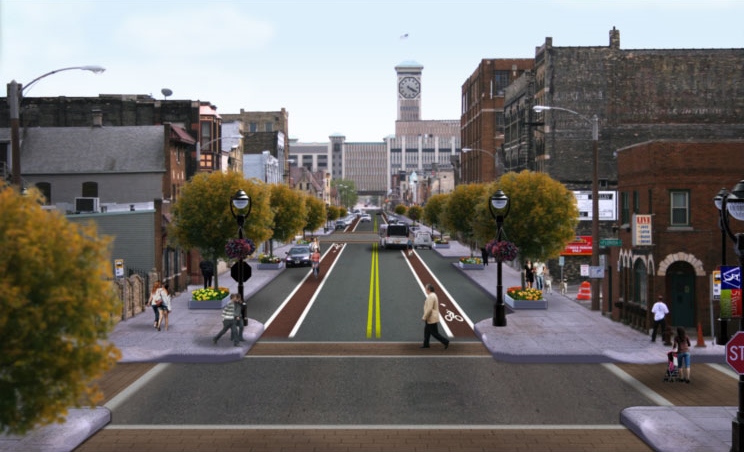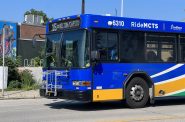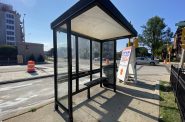Council Passes Complete Streets Policy
Streets for all, not just cars, is now the law of the land.

This rendering of S. 2nd Street includes a variety of features of a “Complete Street.” Many, such as wider sidewalks, street trees and bike lanes, were incorporated in the street’s reconstruction in 2010. Rendering by Kieran Sweeney.
The Milwaukee Common Council unanimously adopted a Complete Streets policy this week aimed at changing city streets to protect the most vulnerable users.
According to the adopted ordinance: “Complete Streets are defined as facilities that are safe, comfortable and convenient for users of all travel modes, including walking, use of mobility aids, bicycling, riding public transportation, and driving motor vehicles.”
The ordinance establishes a broad committee of city stakeholders to review street reconstruction or repaving projects. While many streets would receive curb bump outs, wider sidewalks, painted or protected bike lanes or other traffic calming measures, other streets would see little change.
The proposal was unanimously passed by the council. It was sponsored by council members Ashanti Hamilton, Nik Kovac, Robert Bauman, Michael Murphy, Mark Borkowski, Chantia Lewis, Khalif Rainey, Cavalier Johnson, Jose G. Perez and Russell W. Stamper, II.
The policy comes as a response to the 2015 repeal of the state’s Complete Streets policy. Wisconsin was one of the first states to adopt such a policy, but Governor Scott Walker‘s 2015 budget eliminated the policy as a cost-saving measure.
Bicycle Federation of Wisconsin deputy director Jessica Wineberg led a coalition of citizens and organizations advocating for the policy. “With a reckless driving and pedestrian fatality epidemic, we need to focus on safety,” Wineberg told Urban Milwaukee. “Recent Department of Public Works projects have taken the Complete Streets approach, but when over 1,000 residents, 14 council members, six community organizations and the Department of Public Works all agree that safety needs to come first, things can change at a faster pace and in more areas of the city.”
“So the viewing public knows, most of the major road projects are state projects,” said Bauman, citing projects like the ongoing repaving of Wells Street and reconstruction of W. Wisconsin Ave.
City Engineer Jeff Polenske responded: “what we’ve heard from the [Wisconsin Department of Transportation], with or without their own policy, if the city has a policy that is something we can apply to our projects.”
Murphy expressed concern about the city’s own design engineers. The attitude of some, he suggested, is “I have a traffic manual handbook that was printed by God. I have to follow that handbook because it’s what’s in the handbook.”
Bauman echoed such concerns: “For the 15 years I’ve been on the council I’ve always been pushing this stuff and there has always been pushback. “I certainly support this (Complete Streets policy) and hopefully it has some impact.”
Polenske attempted to assuage their concerns: “We’ve started to make some changes within our department. We have implemented a multi-modal unit… Part of this is to really start initiating a training effort so that there is a really a baseline of what this policy means.”
Kovac warned that the fight over safer streets isn’t over. “Sometimes we’re going to have to make a tough decision where we’re going to have to lose some productivity or travel time. That’s a fight we should be prepared to win,” said the Riverwest and East Side alderman.
Kovac noted that some changes, including the recent addition of protected bicycle lanes over two bridges, were wins for everyone involved, while others will negatively impact the ability of motorists to speed.
If you think stories like this are important, become a member of Urban Milwaukee and help support real independent journalism. Plus you get some cool added benefits, all detailed here.
Political Contributions Tracker
Displaying political contributions between people mentioned in this story. Learn more.
- December 13, 2018 - José G. Pérez received $50 from Mark Borkowski
- February 20, 2016 - Cavalier Johnson received $250 from Robert Bauman
- February 11, 2016 - Nik Kovac received $50 from Jeff Polenske
- May 7, 2015 - Nik Kovac received $10 from Cavalier Johnson
- May 5, 2015 - José G. Pérez received $10 from Cavalier Johnson
Transportation
-
MCTS Adds 28 New Buses
 Jul 13th, 2024 by Graham Kilmer
Jul 13th, 2024 by Graham Kilmer
-
MCTS Designing New Bus Shelters
 Jul 10th, 2024 by Graham Kilmer
Jul 10th, 2024 by Graham Kilmer
-
MCTS Updates RNC Bus Detours To Better Serve Downtown, Riders
 Jul 9th, 2024 by Jeramey Jannene
Jul 9th, 2024 by Jeramey Jannene





















